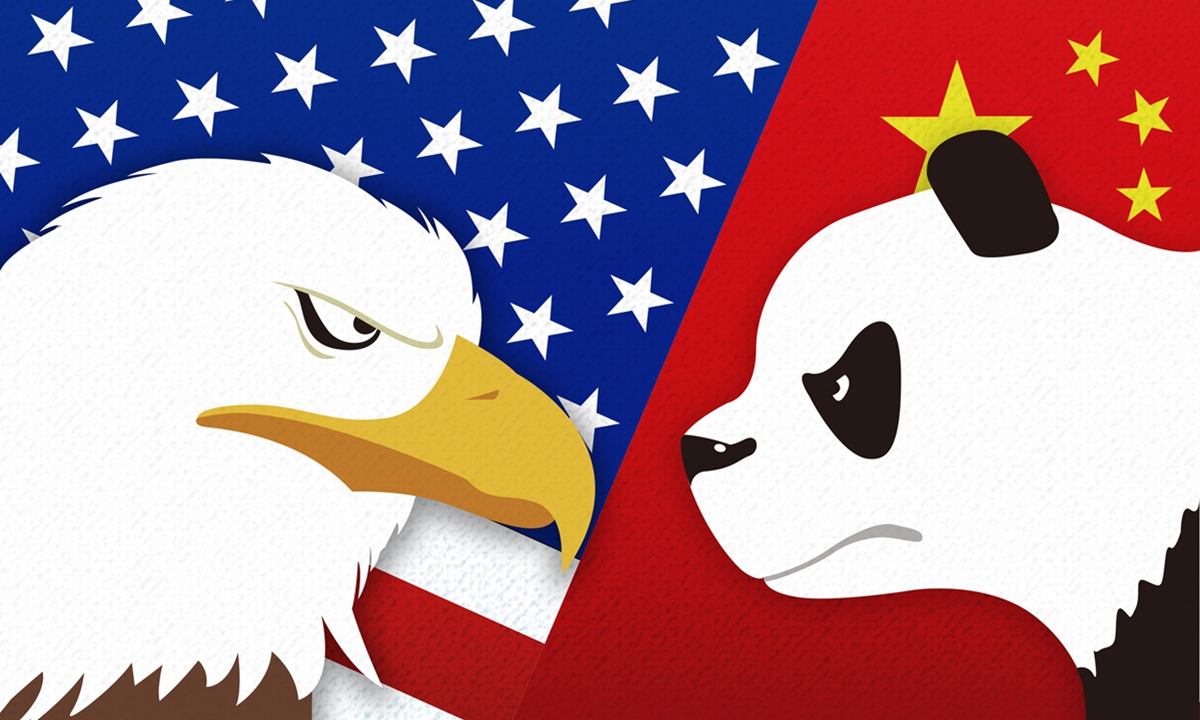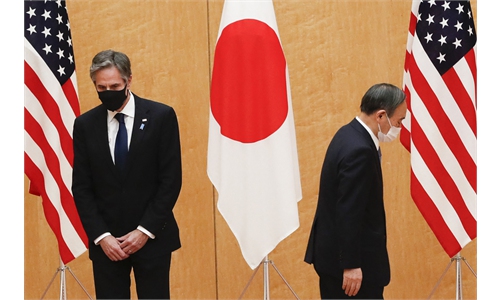
Illustration: Liu Rui
The US and Japan issued a joint press statement after their "2+2" meeting on Tuesday, criticizing China's behavior as being "inconsistent with the existing international order" and "presents political, economic, military, and technological challenges to the Alliance and to the international community." The statement also expressed "serious concern" over China's Coast Guard Law, labeling it as disruptive developments in the region. US Secretary of State Antony Blinken said on Tuesday that "We will push back, if necessary, when China uses coercion and aggression to get its way."The rhetoric of this US-Japan joint press statement is the toughest in comparison to their prior ones. Washington's attitude apparently dominated such change. By caving in to Washington's stance on China, Japan is handing a new endorsement to the new US administration. That would undermine Beijing's trust in Tokyo's consistency in improving relations with China.
The UK on Tuesday released a report on its security, foreign and defense policy. It identified Russia as the "top security threat." It claimed China poses the "biggest state-based threat" to the UK's economic security and presents a "systemic challenge" to British prosperity and values.
Documents or statements involving China are issued almost every day by the US or its major allies. There might be some differences or nuances in their choice of words, but together they have weaved a broad and clear outline of a vision of strategic competition toward China of the US and its major allies.
Such declarations have occurred so frequently that in general, China has already gotten used to them. China knows about the unfriendly strategic intentions it has to face. The temporary strategies these countries use with caution every time are not as important as what they have thought, imposing no strategic impact. China does not need to be constrained or to consume resources for what they have said.
The US has viewed China as the major "strategic threat," and seen containing China as the core of its global diplomacy and military arrangements. The US is contracting globally while concentrating on the Asia-Pacific region to deal with China. But Washington has failed to convene all of its allies in this attempt. The "2+2" meeting will take place between the US and South Korea on Wednesday. South Korea's narrative toward China may differ from that of Japan.
US allies have varied interests with China, forcing the US to establish only a loosely knit group. Washington intends to squeeze as much room as possible for other countries to cooperate with China, and to push them to compete with and even confront with China.
However, the US is not able to find a way to damage China, which is elevating its opening-up with stronger economic strength. So the US has been gradually upgrading its anti-China campaign. Most of the time, the US has talked tough rather than put its words into action, in a bid to create a scenario where it is besieging China.
China still has large room to maneuver. When the US strengthens its campaign, China has also developed stronger abilities to counterattack. And in recent years, China has clearly had a faster pace and achieved greater growth. This is an important reason that the US feels restless and depressed.
In terms of relations with Japan and South Korea in the past few years, China has clearly been more attractive to the two Asian countries than the US is. The two countries' relations with the US are at a standstill. But they have had constantly expanding connotations in their relations with China - although there are also contradictions, such relations weigh more heavily. And their relations with China turn out to be more and more linked to their own future.
There is a difference between strengthening US' ties with its Asia-Pacific allies and inciting them to confront China in the way the US wants them to. Although China has territorial disputes with several countries, the scale of frictions caused by these disputes is limited. The countries concerned know that China does not intend to escalate those disputes, and know how strong a backlash they would have to face if they attack China. Only a blunderer would be instigated by the US into a strategic confrontation with China.
As a result, the US has been talking like a book with its allies while China's strategic goodwill, national strength and bottom line are clear to all. The US has to weigh the risks of challenging China's core interests. It is hoped that those US allies including Japan will keep a clear head. It is no longer safe to rely on the US, and they simply cannot afford to pay for the allegiance to the US over issues concerning China.


